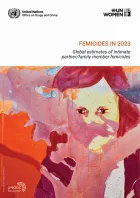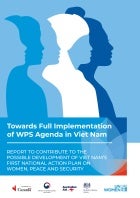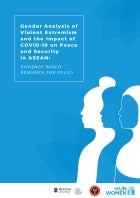1 - 20 of 27 Results
Pagination
Date:
This framework ensures that all efforts are aligned and focused on achieving sustainable change, helping to realize the vision of preventing and eliminating GBV in the country.
Date:
This report highlights some regions and countries of the world that have recorded a slight decrease in the number of femicides, hence contributing to global knowledge of how to effectively prevent femicides. The report reveals that the number of countries reporting on femicides has decreased by 50 per cent in the past five years.
Date:
The ‘Gender Strategy of the National Police of Timor-Leste (2024-2028)’ was jointly developed by the National Police of Timor-Leste, with technical support from UN Women and generous support from the Government of the United Kingdom, the Government of Canada and the Government of the Republic of Korea under the UN Women ASEAN programme Empowering Women for Sustainable Peace: Preventing Violence and Promoting Social Cohesion.
Date:
In January 2024, Timor-Leste's 9th Constitutional Government approved the second phase of NAP 1325 (2024-2028) highlighting the country's commitment to Women, Peace and Security agenda.
Date:
At the United Nations Climate Change Conference (COP28), UN Women together with the Office of the COP28 President, UN High-Level Champion for Climate Change, UNFCCC, IUCN and WEDO, convened Counting on a sustainable future: A global conference on gender and environment data.
Date:
he NAP II has concrete and immediate action to provide conflict-affected with a recognition that they are conflict victims with rights to reparation and justice from the state, along with dedicated support, services and resources that allow them to rebuild their lives with dignity.
Date:
Significant progress has been made in the second year of implementation (January to December 2022) of the project, with all annual targets achieved and 43 percent of immediate outcomes and output-level project targets already reached or surpassed, while the remaining targets are on track. The highlights of the progress and results attained by outcomes are featured in this document
Date:
This country profile provides an overview of the crisis in Myanmar, how the UN Women Myanmar team and our partners are supporting vulnerable women and girls, and our 2022-2023 strategic priorities in Myanmar.
Date:
The objective of the report is to examine the legal gaps that are hindering expenditure allocation and reporting on the landscape of expenditures on GE. Subsequently, a step-by-step roadmap has been presented to strengthen the development, implementation and tracking of gender-responsive budgets toward the achievement of national commitments to the SDGs.
Date:
This study aims to assess the status and results of the implementation of social protection for women and girls within the framework of Resolution No. 15-NQ/TW on a number of social policy issues for the period 2012-2020 in Viet Nam. The report provides policy recommendations to provide information to complete a new document on Social Policy for the period of 2023 - 2030, with a vision to 2045 and focus on advocating for gender responsive social policies.
Date:
The main objectives of this report are to: a) review six NAPs to implement global, regional and national normative frameworks on WPS that can inform the NAP path for Viet Nam. More precisely, this report seeks to evaluate how the plans have intersected the pillars of the WPS agenda and how their lessons learned can be applied to the Vietnamese context, and b) to propose a feasible and effective road map for the building of a NAP for the period 2021-2030 drawing from existing Viet Nam priorities.
Date:
This report has been conducted during the first year of the ‘Master Plan on Socio-economic Development of Ethnic Minorities and Mountainous Areas 2021-2030’ and compiled by the Institute for Social Development Studies (ISDS) and the United Nations Entity for Gender Equality and the Empowerment of Women in Viet Nam (UN Women).
Date:
This report identifies both the persistent trends and changing gender dynamics of violent extremism in the context of the COVID-19 pandemic, based on an expert survey and interview research conducted between July and November 2021. It examined how and to what extent misogyny and hostile beliefs are fuelling violent extremism in the Southeast Asian region during the pandemic, the degree to which misogyny and hostile beliefs in the ASEAN region are fuelling violent extremism, and how these manifest themselves in the offline space.
Date:
The two National Target Programs on New Rural Development and Sustainable Poverty Reduction for the period 2016-2020 have achieved important results. There have been more than 6 million people escaping poverty, approximately 2 million people escaping near poverty; 62.4 per cent of communes met the New Rural Development standard. However, there are still sizable gender gaps in terms of employment, property ownership, and access to public services in rural areas, especially in poor districts.
Date:
The finance maps work much like a dating site for women entrepreneurs and finance providers. First, you open the finance map for your country. Second, simply fill out your profile, filter on what you are looking for and the map will list the finance providers that best match your business.
Date:
The WE Rise Toolkit for Accelerators consists of three tools that provide actionable steps to unlock the power of gender inclusivity for your organisation and acceleration programme. This will enable entrepreneurs from all genders to benefit equally from the support you have to offer. To implement a more inclusive and innovative acceleration programme that yields business benefits for entrepreneurs and ecosystem partners, it’s advised to applying all of the three tools.
Date:
The WE Rise Toolkit for Entrepreneurs consists of four tools that provide actionable steps to unlock the power of gender inclusivity for your business. The WE Rise Toolkit is unique in the fact that it shows how gender equality means good business. You can use our four tools in an iterative manner. Once you’ve completed all four tools you can start over as to further sharpen your gender inclusive business.
Date:
The Review report on the implementation of the National Strategy on Gender Equality (NSGE) 2011-2020 presents an overall review in realizing the objectives, targets and solutions of the NSGE 2011-2020 which serve as a basis for devising NSGE 2021-2030. In addition, the report provides analyses on achievements coupled with obstacles and challenges in the implementation of the NSGE 2011-2020 at various levels of national, ministerial/sectoral and local levels.
Date:
This GRB Timeline showing the sequence of TL Government’s effort with the line ministries, CSOs, private sectors, development partners and academia in pushing forward the country’s commitment to achieve gender equality through assuring gender sensitive budget at workplace.
Date:
This guidance document provides a foundation how to implement human rights principles in the Philippine business setting. Premised on the UN Working Group on Business and Human Rights' which emphasizes that "a gender perspective is always appropriate for all States and businesses in all situations," this document underscores that gender is a cross-cutting concern in securing a better future for people, planet and prosperity.

![[cover]](/sites/default/files/styles/search_image_140px/public/2025-01/ws-c1438-english-pola-puipui-cover-960px.jpg?itok=PRIMSmmE)

![[cover]](/sites/default/files/styles/search_image_140px/public/2024-11/gender_strategy_english_draft-960px.jpg?itok=LQ1B-nZ3)
![[cover]](/sites/default/files/styles/search_image_140px/public/2024-02/tl-c636-VI-Final-NAP1325-cover-960px.jpg?itok=9RRYn-14)
![[cover]](/sites/default/files/styles/search_image_140px/public/2023-12/ap-call-to-action-gender-environment-data-960px.jpg?itok=KUOWLy2p)
![[cover]](/sites/default/files/styles/search_image_140px/public/2023-11/np-english-nap-2023-960px.jpg?itok=TZapkFF9)

![[cover]](/sites/default/files/styles/search_image_140px/public/2023-08/mn-unwomen-myanmar-country-profile-2023-960px.jpg?itok=7unIV0hV)
![[cover]](/sites/default/files/styles/search_image_140px/public/2022-12/vn-Analysis-of-GE-mainstreaming_960px.jpg?itok=T7qqazX2)
![[cover]](/sites/default/files/styles/search_image_140px/public/2022-12/vn-Social-protection-for-women-and-girls-2012-2020-EN-960px_0.jpg?itok=_3B0H-Kn)

![[cover]](/sites/default/files/styles/search_image_140px/public/2022-06/vn-ISDS_Report_DMaEMW_EN_20220530-cover-1679px.jpg?itok=fv_kbXfB)

![[cover]](/sites/default/files/styles/search_image_140px/public/Field%20Office%20ESEAsia/Images/2021/12/vn-PROMOTING-GENDER-MAINSTREAMING-ENG-1679px.jpg?itok=tAwwt8JZ)





